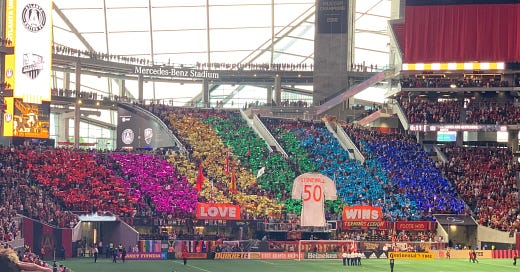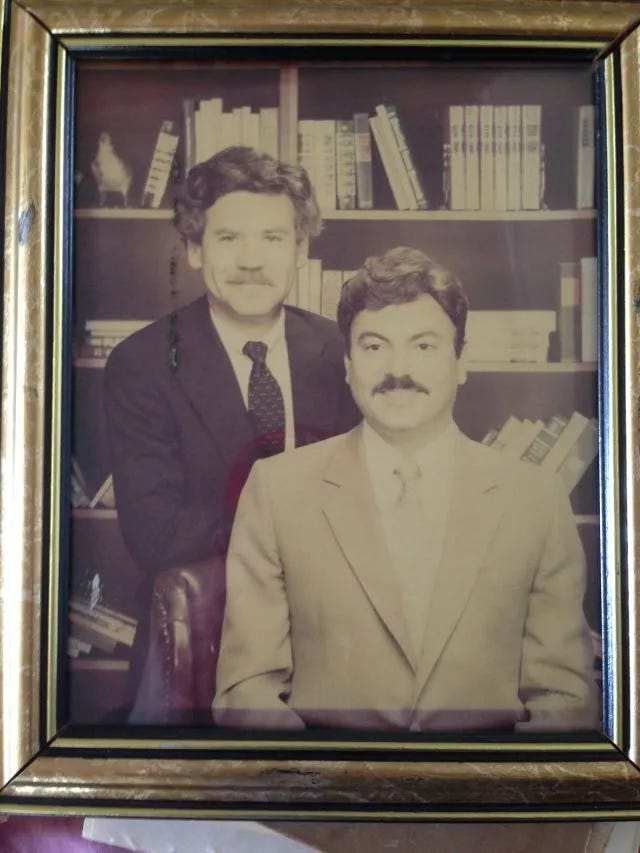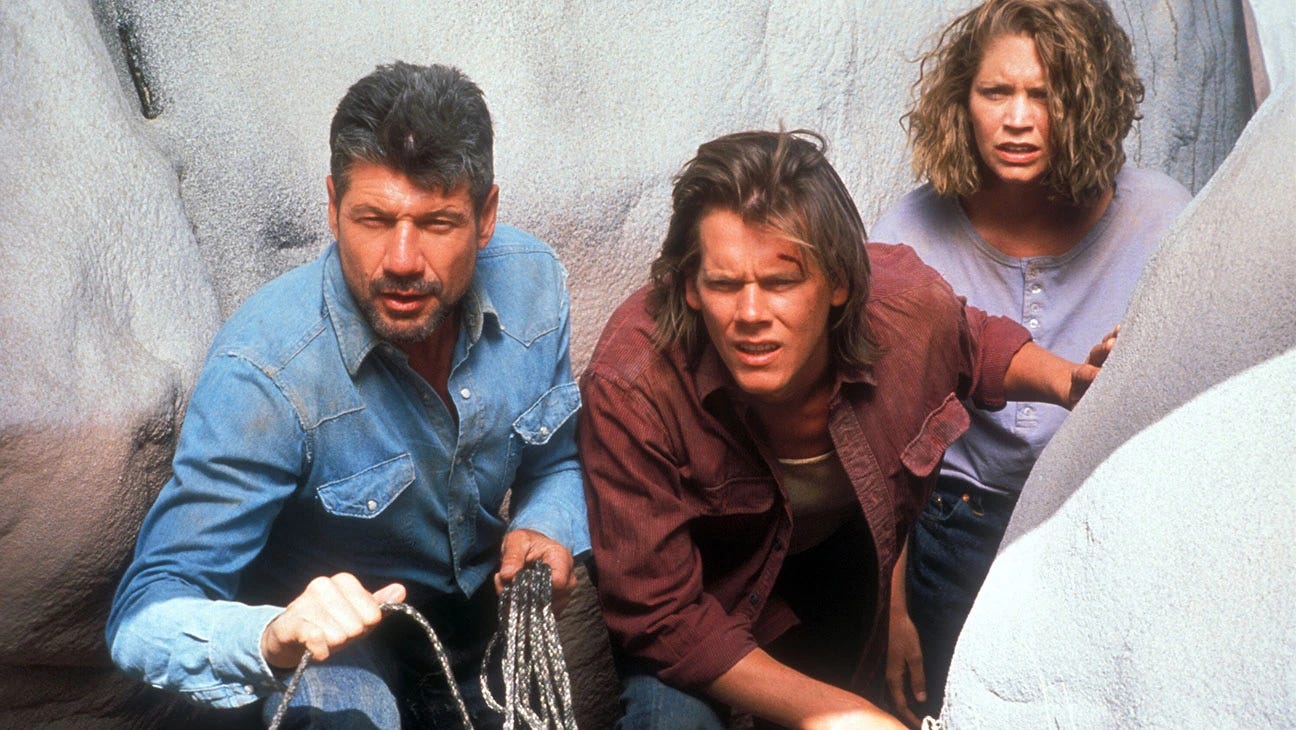Volume 4, Issue 73: Luxury Lounge
"Little Carmine says if we attach Ben Kingsley, the picture's a go."
Hey, the book’s out. If you haven’t bought it yet, you should. If you have, you should write a (hopefully positive!) review of it on Goodreads or Amazon or both. I hope those of you who have a copy are enjoying it.
Last weekend, before I dropped him off at camp for two weeks, my son William and I went to an Atlanta United game. I share United season tickets with a couple of friends here in town, and they’re among my most prized possessions: I find the games thrilling, sure, but I love them most for their atmosphere. Of all the Atlanta sports teams, Atlanta United is by far the most Atlanta, the most representative of that town’s vibrant, diverse, exciting emergence over the last decade. When I moved to Georgia, I didn’t know Atlanta well; I’d always sort of considered it just another large American city, like Dallas, or Minneapolis. But I’ve learned how terrific it is, how in many ways it has revealed itself to be my sort of ideal city: Different people, with different backgrounds, all cramming together and intermingling in new and thrilling ways to produce a unique community all their own—a place you’re proud to be a part of. That’s what a great city does: It makes you feel like a part of something, in tune with a larger hum, connected to a world that’s bigger than just yourself. I always feel this specifically at Atlanta United games, that collective sensation that the best sporting events can give you: That no matter how different you may be from the person next to you, when you are there with them, cheering, rowing in the same direction, you are one: You are together.
Saturday’s MLS game against D.C. United, their first game in the month of June, had an overarching theme to it: It was Pride Night. The history of Pride Nights in North American sports is largely tied to Major League Baseball, actually, though less because the league is particularly progressive and more because it’s the league that plays the most games in June, Pride Month. The first-ever notion of a Pride Night was actually in 1994, when the San Francisco Giants had their first “Until There’s a Cure” Night, an event they still hold every year today. But, as detailed in a smart NBC News piece last week, it was a 2000 incident in which two women were kicked out of Dodger Stadium for kissing that ultimately inspired a Dodgers LGBT Night, which set off a trend that, eventually, led to 29 of the 30 MLB teams having a Pride Night. (The only MLB team that doesn’t? Step right up, Texas Rangers.) Most NFL and NBA teams don’t have Pride Nights because they don’t play in June—of all NFL teams, the one that does is the Washington Commanders—but most leagues do; ESPN has a complete guide to sports Pride Nights. It is incredibly common, but, all told, still very new. There were, fair to say, no Pride Nights when I was a kid, which I’d argue is one of the best reasons to have them now: Our childhoods are when we develop most of our sports memories and lifelong habits, when our sports fandom in many ways locks in place forever. To establish this now is to set a standard for the future. It is to establish a new normal.
Which is why it still felt new to me and even downright thrilling to see Pride Night through my son’s eyes. That’s to say: He didn’t find it the slightest bit unusual or new at all. He cheered along with The Gulch supporters section, which had several Pride Night chants and banners, and he wore an Atlanta United Pride hat, and he waved the little flags they gave to everybody and he thought nothing of any of it. I found it—as someone who remembers a time (a time that constitutes most of my life) when the last place in the world a young gay man or an out lesbian would feel comfortable being themselves in a big public sense would be at a sporting event—inspiring, even moving. But William didn’t think of it that way. He just saw it as normal people out cheering their team in a perfectly normal, unremarkable way. Which is of course what it was.
I remember my Uncle Mike and my Uncle Dave, two of the most important people in my life growing up, being grown men in their 60s who worked together, lived together and had been together for decades, being unable not just to be married, but to tell their co-workers that they loved each other—in fact having to actively pretend otherwise. I remember one of my Scholastic Bowl friends in college, knowing who he was but being unable to say anything, even to the friends who cared about him and who he knew would have supported him, hiding, even lying to himself, out of self-protection. I remember the church I went to as a kid, hearing the minister, a man I had liked and respected, talk about how my uncles, my favorite people, were going to hell, how every day they lived, every day they loved, was an affront against God; it was something that would ultimately push me out of the church all together.
I remember, as Dave lay dying, Mike being afraid to tell the doctors that he—the love of Dave’s life, part of the most perfectly matched couple I have ever known, the two people in many ways helped teach me what love was—was anything other than his “friend.”
I remember all that. I remember when it was like that.
But William doesn’t. Neither does his brother. And neither do their friends.
Now they can go to a game and see people proud of who they are, encouraged to be proud of who they are, a place that might have once rejected them now embracing them. After decades—centuries—of having to deny, to pretend, to hide, they can know that they are welcomed. That the world loves them. That they belong. That a time when the person they love could be dying next to them and they have to lie about what they are to them … that that time is over.
I see Pride Night and am old enough to be moved by it. But my kids don’t know any of that. This is no big deal to them, or anyone around them. They sort of think I’m an idiot for finding any of it so special. Pride Night might as well be Bobblehead Night: Just another theme night at the stadium.
This is what human progress looks like. This is the direction we’re always supposed to be moving.
And for a while, I will confess, this progression felt like it was going unabated. I am often foolish enough to think things like that.
For the better part of two decades, Pride Night celebrations in professional sports went off with a minimum of fanfare, as clubs eagerly showed off their embrace of the LGBTQ community.
Fast-forward to last month, when a Florida lawmaker voiced displeasure with the Pride Night guest list of a Major League Baseball team 2,700 miles away, leading to a cancellation, un-cancellation and hurt feelings of everyone involved — including that of a two-time Cy Young Award-winning pitcher.
Somewhere along the line, the routine act of backing a generic LGBTQ celebration became not-so-routine anymore, with even stitching on practice jerseys becoming a hot-button topic.
"I think it's people's existing political leanings showing a little bit," said U.S. Rep. Mark Pocan, D-Wis., chairman of the Congressional Equality Caucus and one of Congress' 13 openly LGBTQ members. "Since Donald Trump, a lot of people who wear white hoods have left them in the closet for the last six years. You can suddenly say stuff that's unpopular out loud, because this is the current environment."
It is incredibly important to remember, as an extremely small subsection of human beings scream about rainbow flags and woke mustard and domestic beer branding, that this is not what people actually think. The public attitudes on LGBTQ issues are incredibly clear; there are slightly more people against gay marriage than those who think the world is flat. (I suspect there is considerable crossover there.) The change, the progression, of America’s views on this has been one of the most dramatic, rapid evolutions of my lifetime, and an unalloyed victory: People simply being flat-out better to each other than they used to be. Which should be the goal of all of us, all the time.
When there is that sort of seismic change—when there’s that much good that happens that fast—there will be people who will fight that much harder against it, particularly now, as that Rep. Pocan put it, those people feel more far comfortable being openly bigoted than they might have in, say, 2014. But that does not make them any less wrong than they were in the first place, and, more to the point, that should not trick us into believing there are more of them than there actually are. That’s why that simple slogan remains so powerful:
Yes, there is a lot of empty corporate sloganeering this time of year, empty sloganeering that many are trying to shoehorn into some battlefield. But these words still do matter. Because, and I mean this with as much sincerity as such a catch phrase can muster, love does win. We have proof. My kids might not notice it, but that they don’t is the proof. Mike and Dave, and my high school friend, and millions of others, it might not have gotten to them in time. But it did for my kids and their friends. You can’t stop that. I am sorry that the angry and faux-aggrieved are trying to bring back wars that they have already lost. But they have lost them. And I’m proud of that. I’m proud that today Mike and Dave wouldn’t have to hide. I’m proud that my kids wouldn’t understand why they would ever have to. This next generation, these kids, are going to fix so much that we all have broken. They are well on their way.
Here is a numerical breakdown of all the things I wrote this week, in order of what I believe to be their quality.
The Cardinals Should Trade Paul Goldschmidt, MLB.com. Pretty high, that, on the list of sentences I never imagined typing.
The Messi Addition Is a Sign the MLS Has Arrived, New York. As an Atlanta United season ticket holder, I approve.
Ten Potential First-Time All-Stars, MLB.com. Turns out Randy Arozarena is gonna make an All-Star game before Matthew Liberatore, huh.
DC Movies, Ranked and Updated, Vulture. Updated with The Flash.
Pixar Movies, Ranked and Updated, Vulture. Updated with Elemental.
The Thirty: A Home Run Derby Participant for Each Team, MLB.com. I still stay up to watch the Home Run Derby. I don’t feel great about it, but I do.
It Was My Week to Do the MLB Power Rankings, MLB.com. I’m going to stop including the Cardinals, I think.
PODCASTS
Grierson & Leitch, we discussed “Transformers: Rise of the Beasts,” “Miami Vice” and “Tremors.”
Seeing Red, Bernie and I cannot look at this any longer.
Waitin' Since Last Saturday, no show this week.
LONG STORY YOU SHOULD READ THIS MORNING … OF THE WEEK
“Tim Robinson and the Golden Age of Cringe Comedy,” Sam Anderson, The New York Times Magazine. Sam Anderson is great on anything, and he’s especially great on Tim Robinson.
ONGOING LETTER-WRITING PROJECT!
This is your reminder that if you write me a letter and put it in the mail, I will respond to it with a letter of my own, and send that letter right to you! It really happens! Hundreds of satisfied customers!
Write me at:
Will Leitch
P.O. Box 48
Athens GA 30603
CURRENTLY LISTENING TO
“Forever Young,” Bob Dylan. I’m obsessed with the new “Shadow Kingdom” recordings, and this is probably my favorite.
Remember to listen to The Official Will Leitch Newsletter Spotify Playlist, featuring every song ever mentioned in this section.
Also, now there is an Official The Time Has Come Spotify Playlist.
We closed out the first leg—I’ll be in Lincoln, Nebraska and St. Simons, Georgia this fall—of The Time Has Come book tour with a terrific night in Missoula, Montana on Wednesday. I was a little afraid it was just going to be me, the bookstore owner and a moose, but look at all these nice people!
Thank you for everyone who has come out to all these events. I really can’t believe how many of you there have been. You’re just the best.
I leave for London on Wednesday evening, with my parents and sister. I have never been to London. I can’t believe I’m going there to watch such terrible baseball.
Best,
Will








Will, I've read all of these and this is one of the best.
Wonderful column, Will. You're the best.